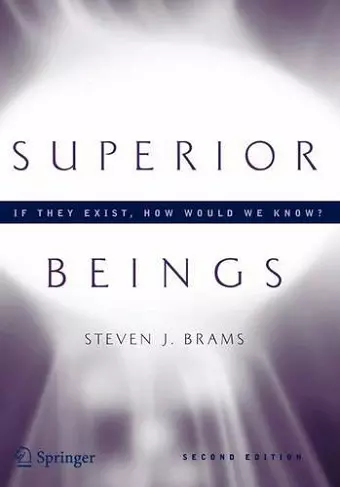Superior Beings. If They Exist, How Would We Know?
Game-Theoretic Implications of Omnipotence, Omniscience, Immortality, and Incomprehensibility
Format:Paperback
Publisher:Springer-Verlag New York Inc.
Published:14th Nov '06
Currently unavailable, and unfortunately no date known when it will be back

The same is true of applications of game theory to history, philosophy religion, and the other humanities. In particular, I know of no attempts to apply game theory to the kinds of p- losophy-of-religion and theology questions that I explored in Superior Beings, By contrast; the nexus between science and religion has been thoroughly analyzed using other methods of inquiry as evidenced by Charles L. Harper Jr (ed. ), Spiritual Information: 100 Perspectives on Science and Religion (West Conshohocken, PA: Templeton Foundation Press, 2006), a huge collection put together in honor of Sir John Templeton's ninetieth birthday Sir John, through the Templeton Foundation, is the primary propo nent and the major benefactor of studies in science and religion today How science and religion are (or are not) connected is, of course, an old subject. It is also a controversial one, extending at least from Galileo's trial in 1633 to the teaching of evolution today. While game theory is a mathematical theory, Superior Beings is emphatically not a scientific work, wherein a theory is tested. Rather, it is an attempt to interpret and explain important philo sophical, religious, and theological questions in terms of the rational choices of ordinary human beings, who are assumed to play games with a superior being. The game theory I use is nonstandard.
From the reviews:
"[Brams’s] arguments, some of them quite complicated, are presented clearly and enough background information is given to enable the non-expert in game theory to follow what is going on.” —H.N.V. Temperley, Nature (March, 1984)
"Superior Beings is an extraordinary book... He [Brams] uses strikingly simple models and generally transparent logic to make some surprising inferences about superiority. His inquiry is carried out with great inventiveness and care, and his book is highly recommended to those interested in religion, philosophy, and the contribution of logical analysis." - D. Marc Kilgur, American Scientist (1984)
"Brams has performed a service in deominstrating that rational analysis need not stop where issues involving faith and emotion begin." - Peter Bennett, New Scientist (1 March, 1984)
"Does game-theoretic theory exist? This book is a fresh partial answer, modestly phrased and interestingly written. Readers will enjoy it and learn from it whether or not the believe in either God or von Neumann." - Dr. Paul R. Halmos, Indiana University
"Professor Brams has boldly invaded an unexplored region where modern game theory and decision theory find applications to monotheistic theology. His carefully constructed arguments would have perplexed Maimonides, Aquinas, Luther, or the great Muslim thinkers... But it is hard to see how they can be ignored by contemporary theologians." - Martin Gardener
"[Brams's] work can be highly recommended as collateral reading for introdcutory courses on mathematical modeling in the social, managerial and decision science-now perhaps even in theology." - William F. Lucas, American Mathematical Monthly (January, 1987)
From the reviews of the second edition:
"Brams analyses human interactions with the divine in order to effectively cast light on some of the toughestquestions in philosophy and theology. … Superior Beings represents a first step in applying game-theoretic analysis to religious issues and reading it brings up many questions and directions for future work. … Overall, Superior Beings is an excellent book that tackles a challenging series of topics with grace and depth." (Angela Vierling-Claassen, MathDL, February, 2008)
ISBN: 9780387480657
Dimensions: unknown
Weight: unknown
202 pages
2nd ed. 2007